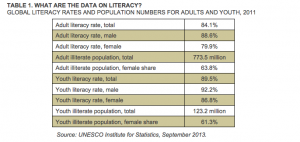A Response to Bolter.
Bolter explains writing as a “technology for collective memory, for preserving and passing on human experience”. He notes that it requires “skill” to learn and “intelligence” to make something of it.
Collective or selective social memory?
Though writing is considered a common human skill, there are so many people who can not write, be it due to learning difficulties, disability or lack of opportunity to learn and those to teach. So where lies their voice? Their recorded history? Their individual thoughts and ideas?
If ability to write is one issue then access is surely another. As many as there are people who can not write, there must be many more who simply don’t have access to writing. Pen and paper is an expense, one many can not afford, let alone the mass of ink and paper it requires to practice and create a written work.
A 2011 UNESCO survey on global literacy has these figure to show.
The Youth total was 89.5% only slightly higher than the Adult rate of 84.1% and whilst that perhaps suggests global literacy will improve and rise over the coming years, it still shows roughly 15% can’t write.
That’s a lot of people… over 700 MILLION adults and 130 MILLION youths.
So how are they to record their stories and experiences of the world?
More than just the ability to record something, there is then an issue with who keeps it? So much is lost of our stories and experiences both oral and written. We throw away things because they frustrate us or because we fell like we don’t have enough room. We forget, we misplace and lose.
The computer perhaps has come to our aid with the seemingly endless amount of space and memory. Though again the issue of access is rife, for those who have access, piles and boxes and stacks of paper disappear saved as virtual pages. We can scan and photograph written things and preserve them all in one compact place. Bolter explains this when he says, “the computer allows a writer or reader to change a text as easily as he can duplicate it.” However, an article by arstechnica would suggest that we are running out of space even on the internet.
So in terms of writing being a preserver for human experience and a collective memory, my question is really, who’s memory? With the issues of access and opportunity to learn writing and its development, network literacy, another issue is perspective. Who’s perspective is really being recorded and how much of what we see as our history is influenced by those who can afford and have the power to choose what we record and remember. Even our view of those who don’t have the means to record their history is influenced our western perspective. Recording has become so much more than just our written history. We record daily, millions of videos everywhere and impassioned speeches and angry protest and wars that serve as our collective memory.. but agin from who’s perspective? Despite things like the internet and cameras becoming more accessible and giving voice to those who once may have had none… is it enough?
I think “One man’s terrorist is another man’s freedom fighter” first written by Gerald Seymour aptly describes what i’m trying to get at.



